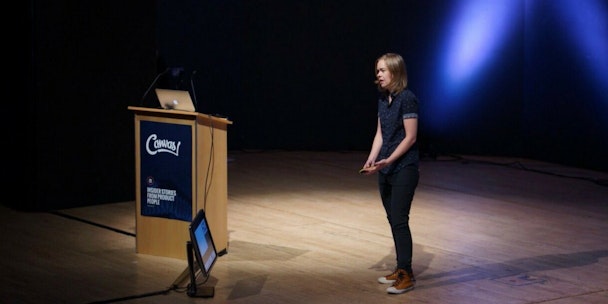Google Assistant personality creator Coats says building emotional connections at scale is key to its global success at Canvas
Emma Coats, the person responsible for creating the personality of Google Assistant, Google's answer to Amazon's Alexa, Apple's Siri and Microsoft's Cortana, says that the key to its success will be in building emotional connections with users at scale in the months and years ahead.

Google's Emma Coats outlines her approach to building the Google Assistant personality
Addressing a 400-strong audience of product designers, innovators and marketers at the Canvas conference organised by product innovation studio 383 last week, New York-based Coats outlined how she had used the experience and storytelling insights gained while working on Pixar movies Brave and Monster's Inc between 2007 and 2012 to help her create the Google Assistant’s personality, which now speaks out from the tabletop gadget in around five million US homes.
Speaking of the development of the personality Coats said: “Our goal on the Personality Team was to take something that is very functional and create the potential for an emotional connection. We want people to smile when they think of Google Assistant. How we do that is the difficult part. We needed to build that emotional connection with users at scale, which may seem at odds as emotional connections are usually made at a much more personal, human level. But I soon realised a field that has been creating emotional connections at scale for many years is the film industry, and coming from that back ground has certainly helped my process in building the Assistant’s personality to where it is so far.

Coats joined Google as editorial lead, personality, Google Assistant, in June 2016 after a career spent in film-making at Pixar and also with Dreamworks and Paramount.
“Coming to Google from a film background meant I had to teach myself a lot about working on actual products rather than on characters," says Coats. “Working in storytelling for a decade, with a background in online, means that creating a personality should be relatively straightforward. But it wasn’t until I got into product that I realised that Pixar was a very iterative itself in its processes.
“At Pixar we would create a piece of film, show it to an audience, take lots of notes and get feedback and then go back to the studio and tweak and alter the film until it was perfect. We’d find out what wasn’t working for an audience and go back and change it to make it better. That helped me to see what actually makes movies work.”
“Pixar films are engaging on so many levels. They have bright colours for kids and there is always stuff in there to keep the adults engaged too. Those films work on many different levels and I wanted to figure out what the hundreds of things were that made them work. I got to 22.”
Coats Tweeted her ‘22 rules of storytelling’ out some years ago and as she says it quickly led to many speaking opportunities, particularly as brands and companies have increasingly embraced the importance of telling stories.
Coats adds: “Those 22 rules are not limited to film, pulling them out to broader concepts where you are trying to make an emotional connection can help you, especially if you remember that the user of your product, film or whatever is the hero.”
So, where did Coats start the process of building the Google Assistant personality?
“Our starting point was recognising that actually having no personality was actually a personality in itself,” says Coats. “Taking a personality that already exists and changing it is difficult, but building a personality from scratch is far easier. In Voice Activation the user is the hero and the Assistant is merely there as the supporting cast. Casting the Assistant as a user’s constant companion is something our team all agreed on.
“Figuring out what the important parts are that you want to capture in that new personality helped us. Using the most important parts of what the Assistant can actually do for the user as an anchor point for its personality was a logical place for us to start. Google Assistant is a product not a real personality, it tells you things and helps you out, the fact it does that suggests that it needed some guiding principles.
Coats says: “It needed to be easy to talk to, so creating it was very much like writing dialogue for film. The Assistant may sound like a person, but we were careful not to allow it to pretend to be an actual person. We had to be very honest and authentic in that respect in order to make it a credible product.
“You can ask it any question you like, so we have had to create a lot of dodges to get it out of trying to pretend to be a real person. For instance, if you ask the Assistant if it is a person, it replies something like “well, people say I do have a lot of personality.” The Assistant has to come at things from a different angle.

While Amazon’s Echo still leads the way in smart voice activated devices, Google is keen to eat into its lead, so ensuring that its Assistant’s personality suits it marketplace was essential, as Coats explains: “There are differences in the personality across different markets. For instance the personality in the UK is different to that in the US and as it launches into new markets we want it to speak as naturally as possible, so in the UK it needs to speak in a British way, it needs to know what a cuppa is. It needs to be helpful at the end of the day.”
“The Assistant is always evolving, it has all the Google tech so it’s already very smart, but it has to be humble as well. As the tech evolves so will the personality. We are always adding in new facts and jokes to make the personality evolve. The tech is not there yet that it can improvise in situations, but that might be the next step.”
Organised by product innovation studio 383, other speakers at the Canvas conference, now in its sixth year, included product design and innovators Hamish Grierson of Thriva, Haiyan Zhang of Microsoft, Jane Kelly of BuzzFeed, Sarah Milton of All4, Bo Ren of Tumblr and Hugo Cornejo of Monzo.
Content created with:

383 Project
Experience Creators. Products Makers.
383 is a digital experience studio. We help the world's biggest companies to get fit for the future.
We're...

